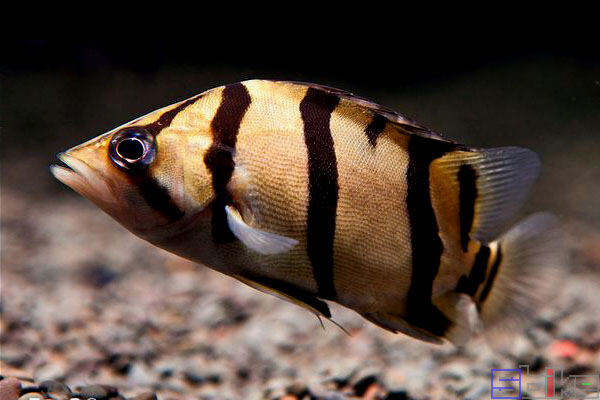
Learn how to care for the NTT Tiger Datnoid—covering tank size, setup, water parameters, feeding, tank mates, and insider tips to help this rare predator thrive in your freshwater aquarium.
Ever seen an NTT Tiger Datnoid patrol your tank? Their bold stripes and sleek form make them look like underwater royalty. But keeping one isn’t just about aesthetics—it’s like adopting a shy, spotlight-loving cat. With the right space, hiding spots, and food routine, they transform from skittish to regal.
Quick answer: The NTT Tiger Datnoid is a semi-aggressive, predatory fish that needs spacious tanks, clean water, meaty foods, and thoughtful tank mates to show its best colors.
Understanding the NTT Tiger Datnoid
Appearance & Size
Also known as the Northern Thailand Tiger Fish (Datnioides undecimradiatus), this datnoid stands out with wider spaced, thin stripes and has more subdued golden tones—but its color remains beautifully consistent and doesn’t fade to black.
They can reach up to 10–12 inches (25–30 cm) as adults.
Quick answer: NTT Tiger Datnoids grow to about 10–12 inches, featuring striking stable stripes and a muted golden hue.
Tank Setup & Environment
Tank Size & Layout
A spacious setup is a must. These fish need at least 100+ gallons, but more is better—ideally with ample length and a cozy layout including driftwood, rocks, or root caves for hiding.
Quick answer: Use a large tank (100+ gallons) with hiding spots—NTT Tiger Datnoids appreciate both space and security.
Water Conditions & Filtration
They thrive in pristine water with steady flow. Filtration should be reliable and strong to manage their predatory lifestyle.
Ideal water parameters:
-
Temperature: 78–84°F (25–29°C)
-
pH range: 6.5–7.5
Quick answer: Keep warm, stable water (78–84°F; pH 6.5–7.5) in a well-filtered tank to keep your NTT Datnoid healthy.
Feeding & Nutrition
Diet
As predators, NTT Tiger Datnoids feast on live or frozen aquatic creatures—like shrimp, fish, worms, and more.
Many can be trained to eat high-protein carnivore pellets—though patience is key, as they may initially reject dry food.
Quick answer: Feed a mix of live/frozen meaty foods and gradually introduce carnivore pellets for balance and ease.
Feeding Frequency
Feed young datnoids twice daily, reducing to once daily or a few times a week as they age—always offering only what they can finish quickly.
Quick answer: Feed juveniles twice a day; adults can be fed less often—just what’s eaten promptly will keep water clean.
Behavior & Tank Mates
Temperament
NTT Datnoids are semi-aggressive and territorial, especially as they grow. They’re intelligent hunters who may start shy but become bold with a stable routine.
Quick answer: These fish gain confidence over time but maintain pride and caution. Give them hiding spots, and they’ll come out when comfortable.
Tank Mate Considerations
Suitable companions include large, non-aggressive fish they can’t eat. Suggestions include:
Small fish are risky—they’re likely to become prey. Avoid aggressive tank mates too.
Quick answer: Choose large, peaceful tank mates like rays, arowanas, and bichirs—keep small fish far away from their reach.
Maintenance, Health & More
Water Quality
High water quality is critical—these fish are sensitive to parameter changes. Regular water changes (around 25% weekly) are recommended.
Quick answer: Maintain pristine water and perform consistent water changes to keep your NTT Tiger Datnoid healthy.
Disease & Care
While specific disease info for NTT Datnoids is limited, issues common to datnoids include stress-induced ailments like infections or fin rot. Ensure quarantine for feeder fish and avoid aggressive mates to minimize risk.
Quick answer: Reduce stress, quarantine feeders, and use gentle tank mates to reduce disease risk.
Common Questions (FAQ)
How big do NTT Tiger Datnoids grow?
About 10–12 inches (25–30 cm).
What tank size is needed?
Minimum 100+ gallons with hiding spots.
What water parameters suit them?
Keep water at 78–84 °F, pH 6.5–7.5.
What do they eat?
Live or frozen meaty foods; can be introduced to carnivore pellets over time.
How often should you feed them?
Twice daily for juveniles; adults can go to once daily or every few days.
What tank mates are suitable?
Large, peaceful fish like rays, arowanas, bichirs; avoid small and aggressive species.
Personal Thoughts & Tips
When I first added an NTT Datnoid, I crammed it into a 100-gallon with crowded decor. It looked unhappy—gliding awkwardly and hiding non-stop. After upgrading to a 180-gallon tank, adding driftwood hides, and refining the feeding routine, it became confident and curious—early perchers perk up when you get it right.
I also switched from only feeder fish to a variety of frozen shrimp and pellets. Clean water and consistency turned it from a lurking shadow into a proud, stripe-showing centerpiece.
Conclusion – Is an NTT Tiger Datnoid for You?
Caring for an NTT Tiger Datnoid is a challenge, but one that’s richly rewarding. Give it the right tank size, food variety, clean water, and peaceful companions—and it will reward you with mesmerizing presence and behavior for years to come.
If you’re ready to embrace that predatory poise and elegance, these datnoids will be among the most dramatic and rewarding fish in your tank.
